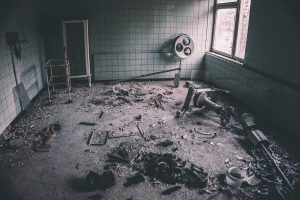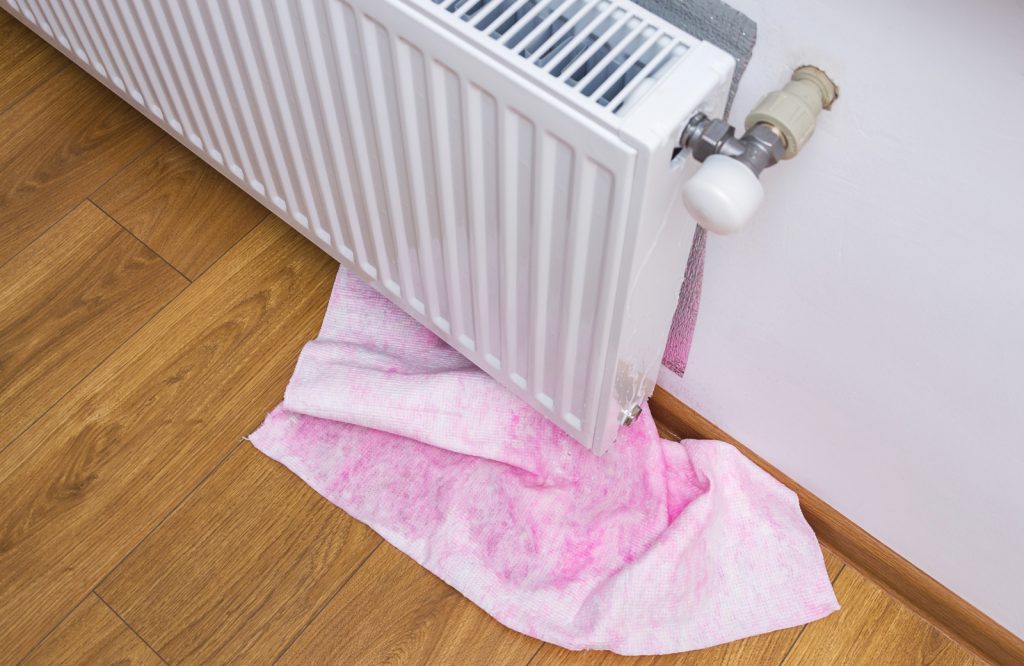Thankfully, exploding radiators are rare but the few occasions they have happened have led to much worse situations than flooding of the house. So here we will look at some issues which may cause a radiator to explode or burst.
The most common causes of radiator bursts and explosions:
- Freezing water
- Internal corrosion
- Hot water expansion
- Blocked or clogged radiator
- Faulty pressure relief valves
- Other defective parts in the system
Radiator leaking from the top
Although it can look like it’s about to burst, a radiator leaking from the top isn’t a sign it will explode. The leaks at the top are coming through the bleed valve or the blanking plug.
It is best to replace the bleed valve completely as you may need to bleed air out of it in the future. With a blanking tape, take it out and apply plenty of PTFE (plumbers tape) on the thread before screwing it back in. Make sure to turn off the valves at the bottom before doing any work on the radiator.
How can a radiator burst?
As central heating systems rely on water to heat the house up, it is inevitable that the water will react to the metals in the radiator, unless you take measures to prevent it. If left untreated or undetected, cracks can develop and get bigger causing burst radiators or pipes. This is most common if a house is unheated for long periods in cold months.

Freezing Water
When water freezes, its volume expands by up to 10%. With a radiator full of water that is frozen, it can cause cracks in the radiator. Water freezing inside a pipe expands and bursts the pipe.
The same thing can happen inside a radiator if a house is left unheated, with no movement of hot water, the water can freeze and crack the radiator. When the boiler is turned on again which pressurises the water in the radiator, it can’t take the pressure and bursts along those cracks.
Most heating systems nowadays have a thermostat that prevents the temperature getting too low in the system, called the frost stat, usually set around 5⁰C to prevent freezing.
Internal Corrosion
Over time, there will always be a certain amount of corrosion inside radiators. As mains cold water has dissolved minerals and gases within it and is never actually pure, corrosion occurs inside the pipework, boiler and radiators. This is common in old radiators which have not been regularly filled with corrosion inhibitor.
This can easily go unnoticed as you don’t often drain the water in the radiators and they slowly corrode from the inside, making the walls thinner, even though the outside is painted pristine white.
This can potentially cause the radiator to burst, blasting steam into rooms or even causing explosions. When pressurised, the radiator walls blow out in the thin areas or at the valves and bleed points.
Thermal Expansion
In a central heating system, thermal expansion is sometimes a threat. When water is heated, it expands and this can sometimes exceed the normal pressure, especially when the water flow is blocked or there is a build-up of material somewhere inside the radiator. If this expansion exceeds the design limits of the radiator, the radiator can burst.
Blocked radiator
If a radiator is not getting hot, by feeling around it, you will find there are cold spots at the bottom but hot at the top. The sludge from magnetite is slowly building up in layers at the bottom of the unit. This clogs the radiator and water isn’t able to pass through. In severe cases, the blockage can cause the radiator to burst when the heating is on.
Faulty Pressure Relief Valves
A relief valve should open if the pressure inside the radiator becomes too great. Most boilers’ normal operating pressure is between 1 and 1.5 bar, but can get close to 3 bar if there is a leak. It is the pressure relief valve’s job to release it.
However, the valves themselves may become faulty because of rust or corrosion. When the pressure inside the radiator becomes too great, the radiator bursts instead of the relief valve opening.
Too much pressure can be caused by a clogged radiator due to sludge build up, a restriction in the system or faulty radiator valves

Conclusion
Central heating radiators can last for many years without causing any major problems but industry experts recommend they be replaced after 8 years of service. This is because they can become clogged or inefficient due to sludge and debris build up and sometimes it is cheaper to replace than do a powerflush of the system.
But very rarely, radiators can burst or even explode if faults are not fixed quickly enough. It is always recommended to have an annual service where the engineer can check the radiators as well, even if it means paying slightly more.
If your radiator has gone beyond repair, find some stylish new radiators for your house from LoveRadiators.com
*The information in this article should be used for general guidance only and not as financial or health advice. Full details are on the link in the footer to our disclaimer page. Always discuss your requirements with a competent and suitably qualified professional before undertaking any work.
Affiliate disclosure
Heatology.co are participants in a variety of affiliate schemes which help fund and run this website, visitors who follow our links and purchase a product may earn Heatology.co a commission. The money we make from affiliate marketing costs you nothing but keeps us online, so thank you for your continued support!
